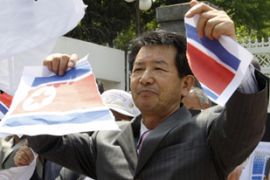China’s Korean balancing act
China’s delicate relationships on the Korean peninsula suffer in row over sunken ship.

But with the South demanding action against North Korea for its apparent role in sinking the Cheonan, those relationships, painstakingly built through years of regional summits and bilateral diplomacy, have taken a blow.
Important ties
China’s relationship with North Korea dates back to the Korean War, when communist Chinese fighters joined their North Korean comrades against the South and its Western allies in 1950.
The conflict, the first of the Cold War, quickly escalated, with the communist North drawing support from China and the South backed by an American-led United Nations force.
The war left the Korean peninsula divided, and set up a political dynamic that has endured to the present day.
China is one of the isolationist North’s few international allies, and its biggest trading partner, providing crucial shipments of food, arms and fuel that have helped the authoritiarian regime in Pyongyang avoid collapse under the pressure of international sanctions.
In return, North Korea has provided Beijing a useful buffer between its borders and the thousands of US troops who have been stationed in South Korea for the past half-century.
Beijing recognises that its support for the volatile regime in North Korea is not problem-free and has at times attempted to use its influence over Pyongyang constructively, for example bringing the country to the table for six-party nuclear talks.
There have also been signs that China’s patience with its unpredictable ally is not inexhaustable. When North Korea carried out a nuclear weapons test in May last year, Beijing agreed to harsher sanctions against Pyongyang, showing there are limits to its support.
But one thing China does not want is a significantly weakened North Korea. Any collapse of the regime would likely cause a crisis that would spill over the border into China, and destabilise the region.
Oddly, South Korea reaps similar benefits from the uncomfortable status quo it endures with regard to its neighbour. Seoul has no desire to suddenly absorb North Korea’s 23 million inhabitants, whose poverty and lack of education would place a major strain on the economy.
It also has no illusions over what a sudden conflict could do to the international investment that has driven its economic growth.
China will hope that this will be enough to defuse tensions in the region, allowing it to continue policies towards the two Koreas that place pragmatism firmly over principle.